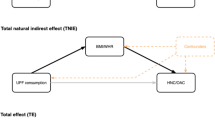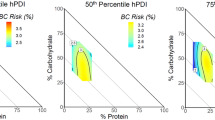Abstract
Background
Several studies have assessed the association between green and black tea consumption and the risk of endometrial cancer (EC) and have yielded inconsistent results.
Objective
The purpose of this meta-analysis is to systematically analyze the effect of green tea and black tea on EC risk.
Methods
PubMed, Embase, Cochrane Library and China Biological Medicine Database were searched through February 2, 2015 to identify studies that met pre-stated inclusion criteria. Overall relative risk (RR) was estimated based on the highest and lowest levels of green/black tea consumption. Dose–response relationships were evaluated with the data from categories of green/black tea intake in each study.
Results
For green tea, the summary RR indicated that the highest green tea consumption was associated with a reduced risk of EC (RR 0.78, 95 % CI 0.66–0.92). Furthermore, an increase in green tea consumption of one cup per day was associated with an 11 % decreased risk of developing EC. (RR 0.89, 95 % CI 0.84–0.94). For black tea, no statistically significant association was observed in the meta-analysis (highest versus non/lowest, RR 0.99, 95 % CI 0.79–1.23; increment of one cup/day, RR 0.99, 95 % CI 0.94–1.03). The power of the estimate of green tea and black tea with risk of EC was 84.33 and 5.07 %, respectively. The quality of evidence for the association between green and black tea with EC risk was moderate and very low, respectively.
Conclusions
The results from this meta-analysis indicate that green tea, but not black tea, may be related to a reduction of EC risk. Large population-based randomized controlled trials and large prospective cohort studies are required to obtain a definitive conclusion and determine the mechanisms underlying this association.




Similar content being viewed by others
References
Torre LA, Bray F, Siegel RL et al (2015) Global cancer statistics 2012. CA Cancer J Clin 65(2):87–108. doi:10.3322/caac.21262
Svampane L, Strumfa I, Berzina D et al (2014) Epidemiological analysis of hereditary endometrial cancer in a large study population. Arch Gynecol Obstet 289(5):1093–1099. doi:10.1007/s00404-013-3074-7
Brocker KA, Alt CD, Breyer U et al (2014) Endometrial cancer: results of clinical and histopathological staging compared to magnetic resonance imaging using an endorectal surface coil. Arch Gynecol Obstet 289(4):851–858. doi:10.1007/s00404-013-3061-z
Olesen TB, Svahn MF, Faber MT et al (2014) Prevalence of human papillomavirus in endometrial cancer: a systematic review and meta-analysis. Gynecol Oncol 134(1):206–215. doi:10.1016/j.ygyno.2014.02.040
Siegel RL, Miller KD, Jemal A (2015) Cancer statistics, 2015. CA Cancer J Clin 65(1):5–29. doi:10.3322/caac.21254
Balentine DA, Wiseman SA, Bouwens LC (1997) The chemistry of tea flavonoids. Crit Rev Food Sci Nutr 37(8):693–704. doi:10.1080/10408399709527797
Jankun J, Selman SH, Swiercz R et al (1997) Why drinking green tea could prevent cancer. Nature 387(6633):561. doi:10.1038/42381
Lambert JD (2013) Does tea prevent cancer? Evidence from laboratory and human intervention studies. Am J Clin Nutr 98(6 Suppl):1667S–1675S. doi:10.3945/ajcn.113.059352
Tang NP, Li H, Qiu YL et al (2009) Tea consumption and risk of endometrial cancer: a metaanalysis. Am J Obstet Gynecol 201(6):605 e601–605 e608. doi:10.1016/j.ajog.2009.07.030
Weiderpass E, Sandin S, Lof M et al (2014) Endometrial cancer in relation to coffee, tea, and caffeine consumption: a prospective cohort study among middle-aged women in Sweden. Nutr Cancer 66(7):1132–1143. doi:10.1080/01635581.2014.948214
Uccella S, Mariani A, Wang AH et al (2013) Intake of coffee, caffeine and other methylxanthines and risk of Type I vs Type II endometrial cancer. Br J Cancer 109(7):1908–1913. doi:10.1038/bjc.2013.540
Je Y, Hankinson SE, Tworoger SS et al (2011) A prospective cohort study of coffee consumption and risk of endometrial cancer over a 26-year follow-up. Cancer Epidemiol Biomarkers Prevent 20(12):2487–2495. doi:10.1158/1055-9965.epi-11-0766
Giri A, Sturgeon SR, Luisi N et al (2011) Caffeinated coffee, decaffeinated coffee and endometrial cancer risk: a prospective cohort study among US postmenopausal women. Nutrients 3(11):937–950. doi:10.3390/nu3110937
Bandera EV, Williams-King MG, Sima C et al (2010) Coffee and tea consumption and endometrial cancer risk in a population-based study in New Jersey. Cancer Causes Control 21(9):1467–1473. doi:10.1007/s10552-010-9575-9
La Vecchia C, Negri E, Franceschi S et al (1992) Tea consumption and cancer risk. Nutr Cancer 17(1):27–31. doi:10.1080/01635589209514170
Stroup DF, Berlin JA, Morton SC et al (2000) Meta-analysis of observational studies in epidemiology: a proposal for reporting. Meta-analysis Of Observational Studies in Epidemiology (MOOSE) group. JAMA 283(15):2008–2012
Shafique K, McLoone P, Qureshi K et al (2012) Tea consumption and the risk of overall and grade specific prostate cancer: a large prospective cohort study of Scottish men. Nutr Cancer 64(6):790–797. doi:10.1080/01635581.2012.690063
(2008) A teacupful of medicine? Nat Struct Mol Biol 15(6):537. doi:10.1038/nsmb0608-537
Stang A (2010) Critical evaluation of the Newcastle-Ottawa scale for the assessment of the quality of nonrandomized studies in meta-analyses. Eur J Epidemiol 25(9):603–605. doi:10.1007/s10654-010-9491-z
Atkins D, Best D, Briss PA et al (2004) Grading quality of evidence and strength of recommendations. BMJ 328(7454):1490. doi:10.1136/bmj.328.7454.1490
Greenland S (1987) Quantitative methods in the review of epidemiologic literature. Epidemiol Rev 9:1–30
Orsini N, Bellocco R, Greenland S (2006) Generalized least squares for trend estimation of summarized dose-response data. Stata J 6(1):40
Greenland S, Longnecker MP (1992) Methods for trend estimation from summarized dose-response data, with applications to meta-analysis. Am J Epidemiol 135(11):1301–1309
Begg CB, Mazumdar M (1994) Operating characteristics of a rank correlation test for publication bias. Biometrics 50(4):1088–1101
Egger M, Davey Smith G, Schneider M et al (1997) Bias in meta-analysis detected by a simple, graphical test. BMJ 315(7109):629–634
Zhou JG, Tian X, Wang X et al (2015) Treatment on advanced NSCLC: platinum-based chemotherapy plus erlotinib or platinum-based chemotherapy alone? A systematic review and meta-analysis of randomised controlled trials. Med Oncol 32(2):471. doi:10.1007/s12032-014-0471-0
Cafri G, Kromrey JD, Brannick MT (2009) A SAS macro for statistical power calculations in meta-analysis. Behav Res Methods 41(1):35–46. doi:10.3758/BRM.41.1.35
Yun TK, Choi SY (1995) Preventive effect of ginseng intake against various human cancers: a case-control study on 1987 pairs. Cancer Epidemiol Biomarkers Prevent 4(4):401–408
Uccella S, Mariani A, Wang A et al (2010) Coffee consumption and the risk of endometrial cancer in postmenopausal women. Gynecol Oncol 116(3):S75–S76
Rossi M, Edefonti V, Parpinel M et al (2013) Proanthocyanidins and other flavonoids in relation to endometrial cancer risk: a case-control study in Italy. Br J Cancer 109(7):1914–1920. doi:10.1038/bjc.2013.447
Takayama S, Monma Y, Tsubota-Utsugi M et al (2013) Food intake and the risk of endometrial endometrioid adenocarcinoma in Japanese women. Nutr Cancer 65(7):954–960. doi:10.1080/01635581.2013.818158
Wang L, Lee IM, Zhang SM et al (2009) Dietary intake of selected flavonols, flavones, and flavonoid-rich foods and risk of cancer in middle-aged and older women. Am J Clin Nutr 89(3):905–912. doi:10.3945/ajcn.2008.26913
Li WQ, Kuriyama S, Li Q et al (2010) Citrus consumption and cancer incidence: the Ohsaki cohort study. Int J Cancer 127(8):1913–1922. doi:10.1002/ijc.25203
Giri A, Reeves K, Luisi N et al (2011) Coffee, tea consumption and endometrial cancer risk: a prospective cohort study. Am J Epidemiol 173:S233
Xu WH, Zheng W, Cai Q et al (2008) The Asp(327)Asn polymorphism in the sex hormone-binding globulin gene modifies the association of soy food and tea intake with endometrial cancer risk. Nutr Cancer 60(6):736–743. doi:10.1080/01635580802192833
Gao J, Xiang YB, Xu WH et al (2005) Green tea consumption and the risk of endometrial cancer: a population-based case-control study in urban Shanghai. Zhonghualiuxingbingxuezazhi = Zhonghualiuxingbingxuezazhi 26 (5):323–327
Hirose K, Niwa Y, Wakai K et al (2007) Coffee consumption and the risk of endometrial cancer: evidence from a case-control study of female hormone-related cancers in Japan. Cancer Sci 98(3):411–415. doi:10.1111/j.1349-7006.2007.00391.x
Kakuta Y, Nakaya N, Nagase S et al (2009) Case-control study of green tea consumption and the risk of endometrial endometrioid adenocarcinoma. Cancer Causes Control 20(5):617–624. doi:10.1007/s10552-008-9272-0
McCann SE, Yeh M, Rodabaugh K et al (2009) Higher regular coffee and tea consumption is associated with reduced endometrial cancer risk. Int J Cancer 124(7):1650–1653. doi:10.1002/ijc.24125
Shimazu T, Inoue M, Sasazuki S et al (2008) Coffee consumption and risk of endometrial cancer: a prospective study in Japan. Int J Cancer 123(10):2406–2410. doi:10.1002/ijc.23760
Xu WH, Dai Q, Xiang YB et al (2007) Interaction of soy food and tea consumption with CYP19A1 genetic polymorphisms in the development of endometrial cancer. Am J Epidemiol 166(12):1420–1430. doi:10.1093/aje/kwm242
Zheng W, Doyle TJ, Kushi LH et al (1996) Tea consumption and cancer incidence in a prospective cohort study of postmenopausal women. Am J Epidemiol 144(2):175–182
Steinkellner H, Hoelzl C, Uhl M et al (2005) Coffee consumption induces GSTP in plasma and protects lymphocytes against (±)-anti-benzo[a]pyrene-7,8-dihydrodiol-9,10-epoxide induced DNA-damage: results of controlled human intervention trials. Mutat Res 591(1–2):264–275. doi:10.1016/j.mrfmmm.2005.04.016
London S, Willett W, Longcope C et al (1991) Alcohol and other dietary factors in relation to serum hormone concentrations in women at climacteric. Am J Clin Nutr 53(1):166–171
Ferrini RL, Barrett-Connor E (1996) Caffeine intake and endogenous sex steroid levels in postmenopausal women. The Rancho Bernardo study. Am J Epidemiol 144(7):642–644
Ahmad N, Feyes DK, Nieminen AL et al (1997) Green tea constituent epigallocatechin-3-gallate and induction of apoptosis and cell cycle arrest in human carcinoma cells. J Natl Cancer Inst 89(24):1881–1886
Laschke MW, Schwender C, Scheuer C et al (2008) Epigallocatechin-3-gallate inhibits estrogen-induced activation of endometrial cells in vitro and causes regression of endometriotic lesions in vivo. Hum Reprod 23(10):2308–2318. doi:10.1093/humrep/den245
Nakagawa T, Yokozawa T (2002) Direct scavenging of nitric oxide and superoxide by green tea. Food Chem Toxicol 40(12):1745–1750
Nie XC, Dong DS, Bai Y et al (2014) Meta-analysis of black tea consumption and breast cancer risk: update 2013. Nutr Cancer 66(6):1009–1014. doi:10.1080/01635581.2014.936947
Tang N, Wu Y, Zhou B et al (2009) Green tea, black tea consumption and risk of lung cancer: a meta-analysis. Lung Cancer 65(3):274–283. doi:10.1016/j.lungcan.2008.12.002
Yu F, Jin Z, Jiang H et al (2014) Tea consumption and the risk of five major cancers: a dose-response meta-analysis of prospective studies. BMC Cancer 14:197. doi:10.1186/1471-2407-14-197
Sun CL, Yuan JM, Koh WP et al (2006) Green tea, black tea and colorectal cancer risk: a meta-analysis of epidemiologic studies. Carcinogenesis 27(7):1301–1309. doi:10.1093/carcin/bgl024
Platet N, Cathiard AM, Gleizes M et al (2004) Estrogens and their receptors in breast cancer progression: a dual role in cancer proliferation and invasion. Crit Rev Oncol Hematol 51(1):55–67. doi:10.1016/j.critrevonc.2004.02.001
Acknowledgments
This work was supported by Instructional science and technology Program of Changde City (2014ZD11), NSFC (Natural Science Foundation of China) (81360351).
Author information
Authors and Affiliations
Corresponding authors
Ethics declarations
Conflict of interest
The authors declare no competing financial interests.
Additional information
Q. Zhou, H. Li and J.-G. Zhou have contributed equally to this work.
Electronic supplementary material
Below is the link to the electronic supplementary material.
404_2015_3811_MOESM3_ESM.doc
Supplementary Appendix3: Supplemental characteristics of studies in the meta-analysis of tea intake and EC risk (DOC 38 kb)
Rights and permissions
About this article
Cite this article
Zhou, Q., Li, H., Zhou, JG. et al. Green tea, black tea consumption and risk of endometrial cancer: a systematic review and meta-analysis. Arch Gynecol Obstet 293, 143–155 (2016). https://doi.org/10.1007/s00404-015-3811-1
Received:
Accepted:
Published:
Issue Date:
DOI: https://doi.org/10.1007/s00404-015-3811-1




